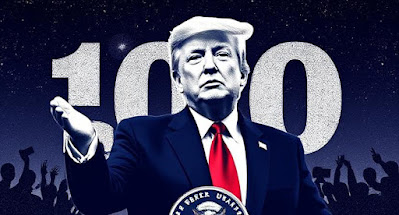Trump’s First 100 Days: Changing the Way the World Works
A Radical Comeback
In his first 100 days back in office, President Donald Trump has made big, unpredictable moves. He started a global tariff war, cut U.S. foreign aid, criticized NATO allies, repeated Russian talking points about Ukraine, and even talked about annexing Greenland, retaking the Panama Canal, and making Canada the 51st U.S. state.
"Trump is even more radical now than he was eight years ago," said Elliott Abrams, a conservative diplomat who worked under Reagan, Bush, and Trump.
Friends Worried, Enemies Emboldened
Trump’s aggressive "America First" approach has worried America's traditional allies and encouraged rivals. Many governments are so unsettled they’re making changes that could last, even if a different U.S. president takes office in 2028.
Meanwhile, at home, critics say Trump is showing signs of weakening American democracy — like verbally attacking judges, pressuring universities, and sending migrants to harsh prisons in El Salvador.

Global Uncertainty Grows
Former U.S. diplomat Dennis Ross said, "We’re seeing huge disruption in world affairs. No one knows what’s coming next."
Reuters interviewed over a dozen officials, diplomats, and analysts worldwide. Most agree some of Trump’s actions may have long-term impacts, though some damage could be reversed if he changes course. So far, that seems unlikely.
Allies Making Backup Plans
Countries are already adjusting:
- Europe is building up its own defense industries to rely less on U.S. weapons.
- South Korea is debating whether to develop nuclear weapons.
- Some nations are considering moving closer to China economically.
The White House defends Trump’s approach, saying he’s fixing mistakes made during Joe Biden’s presidency. A spokesman said Trump is getting Russia and Ukraine to negotiate, fighting fentanyl, protecting American workers, and standing tough on the border.
Americans Have Mixed Feelings
More than half of Americans — even some Republicans — think Trump is too close to Russia. Many also don’t support his talk about expanding U.S. territory, according to a recent Reuters/Ipsos poll.

The Future of the World Order at Risk
For 80 years, the U.S. has helped lead a world system built on free trade, rule of law, and respect for borders. Trump’s transactional approach — treating global politics like business deals — is shaking that system.
He blames trading partners for "ripping off" America and has launched major tariffs, causing financial markets to wobble and raising fears of a global recession.
War in Ukraine and NATO Tensions
Trump has shifted U.S. policy on Ukraine, shouting at President Zelenskyy and pushing for peace talks favoring Russia. He has also repeatedly insulted NATO allies, calling them freeloaders.
Germany’s new leader, Friedrich Merz, warned that Europe’s relationship with America could suffer badly, saying Trump’s "America First" is turning into "America Alone."
Expansionist Talk Raises Eyebrows
Trump’s bold statements about annexing Greenland, taking back the Panama Canal, and turning Canada into a U.S. state have alarmed many.
Some fear Trump is trying to bring back an old Cold War model where powerful countries divide the world into zones of influence. Though he hasn’t detailed how he'd actually take new territory, countries like Denmark are deeply worried.
Danish Prime Minister Mette Frederiksen said Trump's actions threaten the world order that the U.S. and Europe built together.

How Countries Are Coping
Governments are adjusting:
- The EU is preparing tariffs against the U.S.
- Germany and France are increasing military spending.
- Canada is strengthening ties with Europe, frustrated with the U.S.
- South Korea is trying to maintain its U.S. alliance despite Trump’s threats to pull troops.
- Japan is scrambling to respond to sudden tariff moves.
Some governments, like Spain, are looking to strengthen trade with China — filling the gap left by America’s more aggressive stance.
Is It Too Late to Repair the Damage?
Some experts believe it's not too late for Trump to change direction, especially if Republicans start worrying about losing control of Congress.
But if Trump stays the course, repairing America's global reputation could take years.
"What’s happening isn’t beyond the point of no return," said Aaron David Miller, a former U.S. diplomat. "But the damage being done to U.S. relationships — and how much it benefits America's rivals — is probably impossible to fully measure."




.jpg)

0 Comments